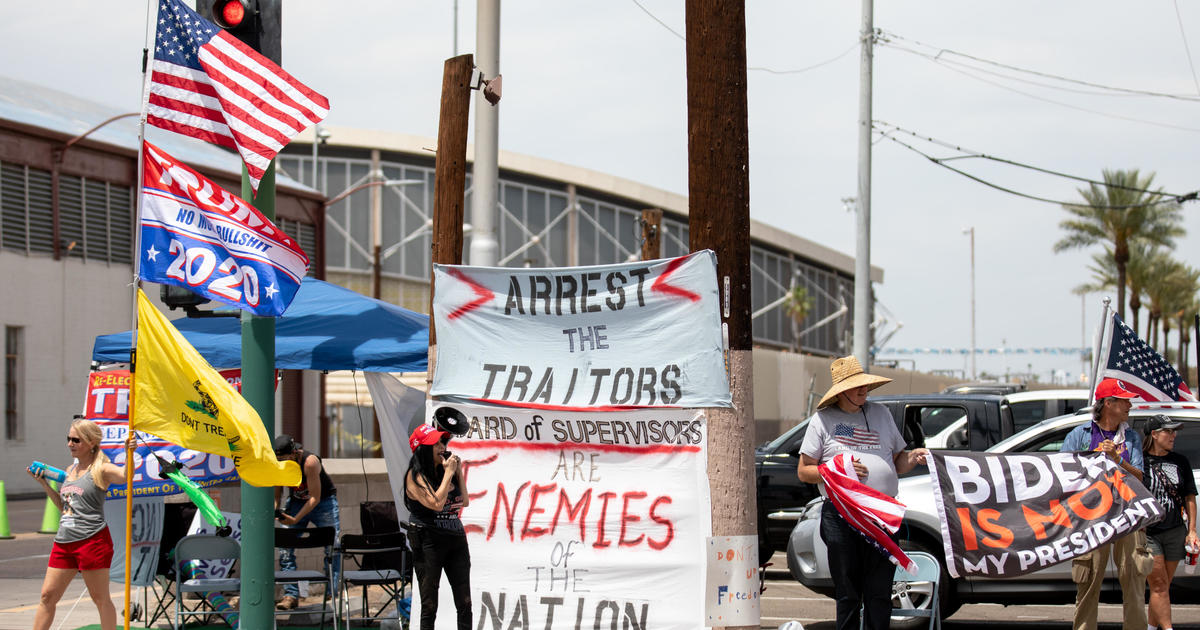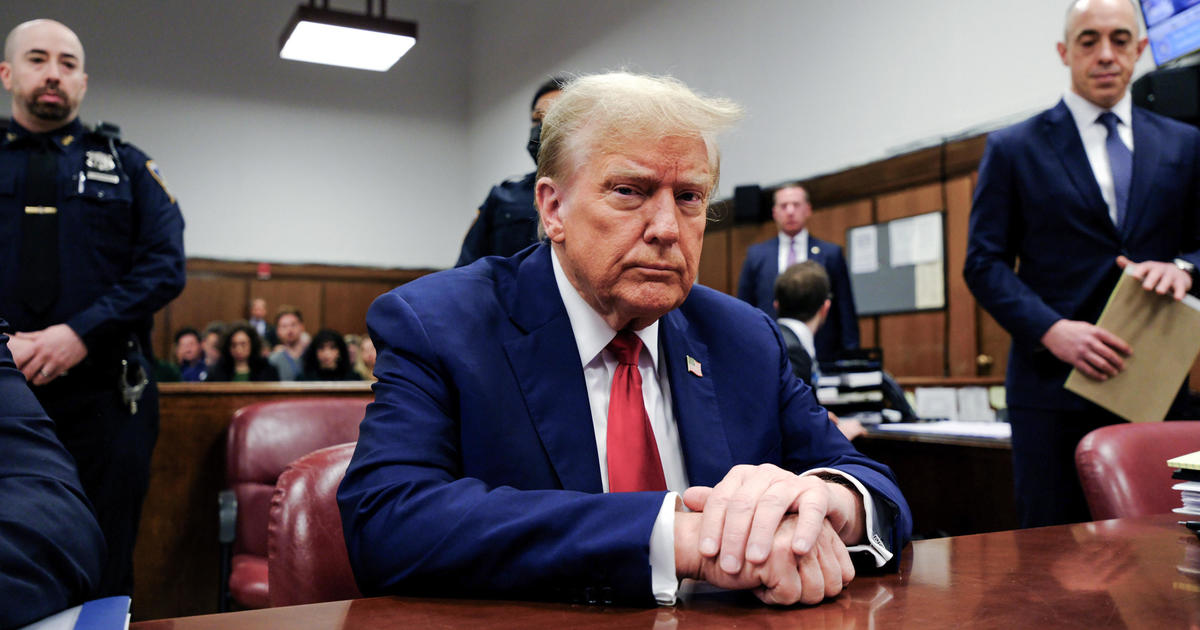2020 Daily Trail Markers: The Iowa caucuses, in all their weird glory
The Iowa caucuses are just 26 days away. The state formally kicks off the nominating process, but caucuses work differently than traditional primaries. If you're looking for a refresher on how this complex process works, or learning about it for the first time, CBS News campaign reporters Adam Brewster and Musadiq Bidar have a full article detailing the step by step process and some new wrinkles this year.
Unlike a primary, a caucus is not a "one person, one vote" system. Instead, Iowans will be electing delegates through a complex process that dates back to the 19th century. There are no ballots, and caucus-goers aren't technically voting for candidates but rather for delegates who support a given candidate. Caucus-goers elect these delegates by moving around a room, known as a precinct.
If you support one candidate, you move to one part of the room. If you support another candidate, you go somewhere else. In order for a candidate to win delegates in a precinct, they will need at least 15% support in a room (although that percentage is slightly higher in some precincts). To participate in the Democratic caucuses, people need to be registered voters with the Democratic Party. It is possible for people to register to vote and change their party registration on caucus night.
Since 1976, seven of the last nine Democratic nominees have won the Iowa caucuses, including the last four nominees. However, in that same time frame, only two winners of the Democratic caucuses have gone on to win the general election: Jimmy Carter and Barack Obama. The number of delegates a candidate wins in precincts across Iowa will ultimately determine how many of Iowa's 41 pledged national delegates the candidate wins. This year, though, the Iowa Democratic Party will also be reporting popular vote totals from the caucuses for the first time.
You can read about how all of this works in more detail here.
FROM THE CANDIDATES
LINCOLN CHAFEE
In his first event since filing as Libertarian candidate for President, Lincoln Chafee mainly talked at the National Press Club in Washington, D.C., about the situation in Iran, bringing up his "No" vote as a Republican U.S. Senator against the Iraq war in 2002. He repeatedly called the Iraq war "the worst strategic blunder" and said the recent events with Iran was a big motivator for jumping in. When asked about what he could bring that's missing to the race, he said better "discourse on foreign affairs."
"They're not strong enough," Chafee told CBS News political unit broadcast associate Aaron Navarro when asked about how Democratic candidates have been responding to Iran. "They're saying, 'Oh, Soleimani was an evil man.' They're not going to root cause, the invasion of Iraq and the bad mistakes that we made."
"They're playing into anger and fear, as to what happened after September 11th. And we are angry when some contractor gets killed in Iraq, but it's better to have a cooling down than a heating up in this age of nuclear weapons," he said.
Chafee, who previously was a Republican mayor of Warwick, Rhode Island, a Republican U.S. Senator, an independent Governor of Rhode Island, and a 2016 Democratic presidential primary candidate, said he has "found his political home" with the Libertarian Party. "Anti-war, anti-cronyism, anti-debt, anti-torture, anti-death penalty, anti-war on drugs, anti-spying, pro-personal freedom, pro-truth. On these and other issues, I saw a party I could proudly embrace," he said.
"The truth is Dems and Republicans cannot be trusted to fulfill their campaign promises. "Yes, we're going to end the war, yes we're going to end the war." They go on and on. The Libertarian Party is the party of real change, and will bring a more peaceful world, a better federal budget and fervent protection of our civil liberties. We must right the wrongs the lies of the past have created, in order to build a future of peace and prosperity. And it all starts by telling the truth."
STATE-BY-STATE
NEVADA
Marc Lotter, a top aide to President Trump's campaign, is headed to Nevada this Friday to headline two fundraisers for Nevada Republicans. State party chair Michael McDonald and Dean Heller, who was defeated in 2018 as he sought a second term in the Senate, are slated to join Lotter.
However, CBS News campaign reporter Alex Tin says it was Ivanka Trump's visit for the CES tech show in Las Vegas this week that drew headlines and some outrage. Some denounced Trump as little qualified for a coveted keynote slot at one of the industry's largest shows, citing other prominent female tech leaders that have yet to be spotlighted. But she made little mention of the controversy on stage in Nevada with Gary Shapiro, president of the Consumer Technology Association, instead tightly focusing her remarks on the president's economic policy.
NEW HAMPSHIRE
Representative Tulsi Gabbard opened up her very first campaign office in downtown Manchester, New Hampshire this week. The Hawaii Congresswoman has spent all of the new year in New Hampshire before heading back to D.C. for a congressional briefing Wednesday afternoon. Gabbard's office will serve as a hub for phone banking for a campaign that's recruited nearly 50 full-time volunteer organizers in New Hampshire, according to a senior campaign official.
By comparison, CBS News campaign reporter Nicole Sganga says Mayor Pete Buttigieg has 13 offices in the Granite State, with at least one in each of New Hampshire's ten counties. Vice President Joe Biden has eleven offices, including their Manchester office. Andrew Yang, who opened his latest office in Keene last week, has a total of ten field offices.
SOUTH CAROLINA
Steve Benjamin, the mayor of South Carolina's capitol city, hit the campaign trail with Democratic contender Michael Bloomberg Tuesday in a continuing effort to help spread the former New York City mayor's message throughout the country. CBS News campaign reporter LaCrai Mitchell reports that Benjamin was making stops with the campaign in Chicago, Wells (Minnesota), and Akron on Tuesday.
As a national co-chair for the campaign, Benjamin has been on at least four other trips with or on behalf of Bloomberg this cycle. The campaign made an early decision to not focus on early states — including South Carolina — but Benjamin says their strategy is proving effective.
"The campaign made a determination early on that everyone else had gotten such a head start in South Carolina, we were going to focus on the March dates and I believe that the strategy is bearing itself out," Benjamin told CBS News. "It's a 21st century strategy [and] it's very different but American politics is so much different now than it was even just a decade ago."
Benjamin, who's been a mayor for nearly 10 years and is the former president of the U.S. Conference of Mayors, told CBS News that it's important for Bloomberg to have "a growing group of mayors endorsing and supporting him." Benjamin was an early endorser of Bloomberg and announced his support in November — days before Bloomberg officially launched his campaign. Since then, the Columbia mayor says his team has been helping the Bloomberg campaign formulate policy, provide "pragmatic solutions to complex problems," and identify individuals to work on the campaign — recommendations that Benjamin says have been valued and implemented.
BY THE NUMBERS
A DELEGATE MATTER
The Ohio Democratic State Party told CBS News political unit associate producer Eleanor Watson that the party had an unprecedented turnout for their pre-primary caucuses Tuesday night. Although the party is still tabulating exactly how many delegates were chosen, a spokesperson said a record-number 3,300 voters applied to be delegates.
The previous record was set last presidential cycle with 800, according to the party. These delegates will not be allocated until Ohio's primary on March 17th, and the delegates chosen Tuesday will be awarded proportionally to candidates who earn more than 15 percent of the vote in congressional districts or statewide.
ON THE $$$
Republican New York Congresswoman Elise Stefanik's campaign announced it raised more than $3.2 million in the fourth quarter of 2019 after she made headlines for her criticism of House Democrats' handing of President Trump's impeachment. According to her campaign, this quarter alone was more than she raised or spent in any two-year election cycle. It included contributions from all twelve of her district counties and donations from more than 50,000 new donors. The average donation to her campaign was $50.
Stefanik had nearly $3.4 million cash on hand heading into 2020. Her cash haul is more than what was raised by some Senate candidates in the fourth quarter. Meanwhile, CBS News political unit associate producer Sarah Ewall-Wice says Stefanik's Democratic challenger, Tedra Cobb, raised more than $2 million over the same month period, more than she raised in her whole 2018 campaign against Stefanik. It came from more than 75,000 donations. Her average donation was more than $27.
Despite the large fundraising numbers in the race, Cook Political Report currently rates the NY-21 district as solidly Republican in 2020.



